STATE GOVERNMENT
WSLC 2020 Legislative Report: Some wins, then COVID
WSLC 2020 Legislative Report summarizes session, how each legislator voted
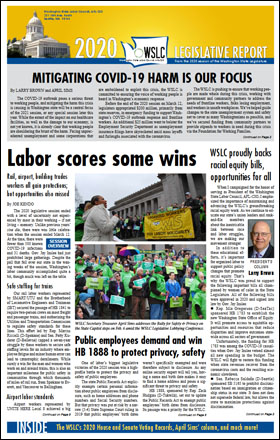 OLYMPIA (May 12, 2020) — The Washington State Labor Council, AFL-CIO has published its 2020 Legislative Report summarizing this year’s session of the State Legislature, describing how bills on working family issues fared, and scoring all legislators on how they voted.
OLYMPIA (May 12, 2020) — The Washington State Labor Council, AFL-CIO has published its 2020 Legislative Report summarizing this year’s session of the State Legislature, describing how bills on working family issues fared, and scoring all legislators on how they voted.
Download the full 8-page report (PDF) or just the 2020 WSLC Voting Record.
Printed copies of the 2020 Legislative Report will be mailed to WSLC-affiliated unions next week, along with the results of this Saturday’s Virtual COPE Endorsement Convention. At that meeting, hundreds of delegates representing unions from across Washington state will gather electronically to vote on which candidates for Congress, State Legislature, statewide office and statewide judicial races have earned organized labor’s support in the 2020 elections. Officers, staff, and rank-and-file members of affiliated unions also can request additional copies or call 206-281-8901 to order multiple copies.
Following are some of the individual reports that appear in the publication:
Mitigating COVID-19 Harm Is Our Focus (by Larry Brown and April Sims)
Labor Scores Some Wins (session overview by Joe Kendo)
Public Employees Demand and Win HB 1888 to Protect Privacy, Safety
WSLC Proudly Backs Racial Equity Bills, Opportunities for All (President’s column)
WSLC’s Agenda Is All About Worker Solidarity (Secretary Treasurer’s column)
Transparency Needed to Address Health Costs (by Sybill Hyppolite)
Progress on Labor-Climate Policies, But More Needed (by Vlad Gutman-Britten)
Mitigating COVID-19 Harm Is Our Focus
By LARRY BROWN and APRIL SIMS
From the WSLC 2020 Legislative Report
The COVID-19 outbreak poses a serious threat to working people, and mitigating the harm this crisis is causing in Washington state will be a central focus of the 2021 session, or any special session later this year. While the extent of the impact on our healthcare facilities, as well as the damage to our economy, is not yet known, it is already clear that working people are shouldering the brunt of the harm. Facing unprecedented unemployment and some corporations that are emboldened to exploit this crisis, the WSLC is committed to ensuring the voice of working people is heard in Washington’s economic response.
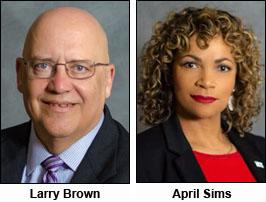 Before the end of the 2020 session on March 12, legislators appropriated $200 million, primarily from state reserves, in emergency funding to support Washington’s COVID-19 outbreak response and frontline workers. An additional $25 million went to bolster the Employment Security Department as unemployment insurance filings have skyrocketed amid mass layoffs and furloughs associated with the coronavirus.
Before the end of the 2020 session on March 12, legislators appropriated $200 million, primarily from state reserves, in emergency funding to support Washington’s COVID-19 outbreak response and frontline workers. An additional $25 million went to bolster the Employment Security Department as unemployment insurance filings have skyrocketed amid mass layoffs and furloughs associated with the coronavirus.
The WSLC is pushing to ensure that working people are made whole during this crisis, working with government and community partners to address the needs of frontline workers, folks losing employment, and workers in unsafe workplaces. We’ve helped guide changes to the state unemployment system and safety net to cover as many Washingtonians as possible, and we’ve secured funding from community partners to provide stipends to workers in need during this crisis via the Foundation for Working Families.
In tandem with this work on the ground, the WSLC is in conversation with affiliates, identifying policies to bring to Olympia in 2021 in support of our members and all working people in Washington.
While our state is in the enviable position of being able to tap millions in reserves for emergency funding, more resources will be needed to mitigate the worst impacts of this crisis. Hospitals and healthcare workers will need more support, and we’ll need serious investments in job assistance, apprenticeship programs, and child care. We need stronger protections for workers on the job, including more avenues for holding unscrupulous and dangerous employers responsible.
Our state’s backwards, regressive tax system exacerbates the issues we face in our response. State revenue is drawn heavily from sales tax, an unreliable source in a state where residents are urged to stay in their homes, and a decline in sales transactions seems certain. Reliance on sales tax revenue, already tenuous and drawn disproportionately from working people, is a significant stumbling block. This crisis lays bare the urgency of reforming our tax code.
We will need to fight for bold policy ideas that provide concrete relief to working people, not shying away from systemic changes; and we need allies to succeed.
This makes electing strong labor champions to the State Legislature even more important. We need fierce advocates to have our backs in Olympia, advocates who know the struggles of working people from personal experience. Luckily, we have no shortage of union members running for office in November 2020, many of whom have attended the WSLC’s Path to Power candidate training program.
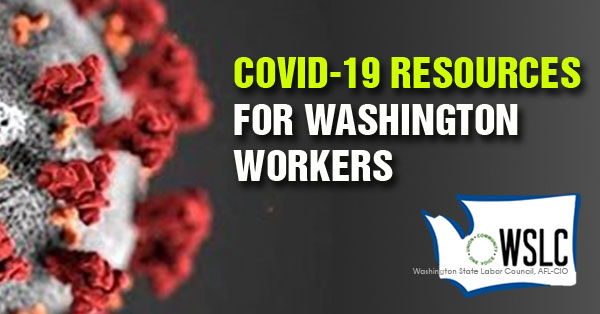 This crisis is reshaping many aspects of our daily lives, and will continue to do so. What we learn as we respond will form the contours of our work in Olympia in 2021. The labor movement was made for moments of crisis like this, built by working people to defend against many of the same problems so clearly illuminated by the COVID-19 pandemic. We’ll continue to use that strength to fight for policies that put working people before corporate profit, reshaping our economy in response to the changes already occurring in working people’s lives.
This crisis is reshaping many aspects of our daily lives, and will continue to do so. What we learn as we respond will form the contours of our work in Olympia in 2021. The labor movement was made for moments of crisis like this, built by working people to defend against many of the same problems so clearly illuminated by the COVID-19 pandemic. We’ll continue to use that strength to fight for policies that put working people before corporate profit, reshaping our economy in response to the changes already occurring in working people’s lives.
To read more about the WSLC’s response to the COVID-19 outbreak, visit wslc.org/covid19.
Larry Brown is President and April Sims is Secretary Treasurer of the Washington State Labor Council, AFL-CIO.
Labor Scores Some Wins
By JOE KENDO
From the WSLC 2020 Legislative Report
The 2020 legislative session ended with a level of uncertainty not experienced by most in their working – if not living – memory. Unlike previous years’ sine die, there were was little celebration when the session ended March 12. At the time, there were fewer than 500 known COVID-19 infections and 31 deaths. Gov. Jay Inslee had just prohibited large gatherings. Despite the pall that fell over our state in the waning weeks of the session, Washington’s labor community accomplished quite a bit, though much was left on the table.
Safe staffing for trains
Our rail labor workers represented by SMART/UTU and the Brotherhood of Locomotive Engineers and Trainmen (IBT) secured the passage of HB 1841 to require two-person crews on most freight and passenger trains, and authorizing the Utilities and Transportation Commission to regulate safety standards for these lines. This effort led by Rep. Marcus Riccelli (D-Spokane) and Sen. Patty Kuderer (D-Bellevue) capped a seven-year struggle by these workers to secure safe staffing levels for an industry where employee fatigue and minor human error can lead to catastrophic derailments. While surely a win for the men and women who work on and around trains, this is also an important milestone for public safety in communities through which thousands of miles of rail run, from Spokane to Everett, and Vancouver to Bellingham.
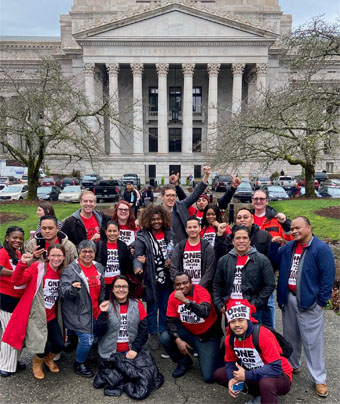
UNITE HERE Local 8 members led the charge to pass SB 6217, allowing the Port of Seattle to raise wages for airline catering workers at Sea-Tac Airport, so they are covered by the City of SeaTac’s $16.34 minimum wage standard.
Airport labor standards
Airport workers represented by UNITE HERE Local 8 achieved a big win with the passage of SB 6217, sponsored by Sen. Karen Keiser (D-Des Moines). This closes a loophole denying certain airport employees, including airline catering workers, access to City of SeaTac’s historic Prop 1 minimum wage standard. Passed in the first session it was introduced – a rarity in Olympia – thousands of lower wage workers who support our bustling airport secure the promise of more livable wages. Rep. Mia Gregerson (D-SeaTac) sponsored the House version off this bill.
State contracting accountability
An eight year effort to promote transparency and accountability in government contracting concluded when HB 1521, sponsored by Rep. Laurie Dolan (D-Olympia), received a concurrence vote by the House on March 11. By requiring a comprehensive cost-benefit analysis before contracting out state-employee work and holding private contractors accountable for their performance, Washington’s residents and taxpayers will get a higher value for their dollar while protecting good public-sector union jobs. Organizing work by the Washington Federation of State Employees/AFSCME Council 28 and the Washington Public Employees Association/UFCW 365, plus a boost from the Washington State Building and Construction Trades Council, lead to passage of this landmark piece of legislation.
Big wins for building trades
Speaking of the building trades, it was a good year to be represented by unions in construction. Two years of diligent work by the Plumbers and Pipefitters (UA) lead to the passage of a major overhaul of our plumbing code with Sen. Keiser’s SB 6170. And not to be outdone by herself, Keiser’s bid-listing bill, SB 5457, a major priority for Ironworkers Local 86, also made it to the governor’s desk for signature. This legislation will extend the requirement for prime contractors to list their subcontractors of public works project bids to structural steel and rebar work, ending the practice of bid-shopping for this work. A proven concept for electrical, plumbing, and HVAC work, the extension of this practice will protect high-road subcontractors from unscrupulous primes seeking to pad their profits at the public’s – and workers’ – expense.
Some missed opportunities
Unfortunately, there were several missed opportunities during the session that will require more legislative attention and aggressive organizing in 2021. WSLC priority legislation dubbed the Worker Protection Act, HB 1965 sponsored by Rep. Drew Hansen (D-Bainbridge Is.) failed to move out of the House. This would provide an avenue for whistleblowers to enforce labor laws on behalf of the state when agencies are unable to comprehensively address wage, discrimination, equal pay, and health and safety laws.
With the rapid expansion of Washington’s cannabis industry, UFCW 21 supported several concepts meant to promote safety, wage stability, health care, and professionalization of the workplace in the form of HB 2361 (Rep. Strom Peterson) and SB 6393 (Sen. Steve Conway). Unfortunately, only the Senate bill advanced from policy committee, and it failed to receive a vote in the Ways and Means Committee.
While the Legislature did vote to pass Rep. Beth Doglio’s HB 1590 to authorize local sales taxes for affordable housing investments, it failed to move on an odd-fellows effort by Reps. Nicole Macri and Larry Springer, HBs 2907 and 2948, that would have raised revenue in a much more progressive way by imposing a modest excise tax on large employers’ payroll in King County. By raising millions of dollars per year for investment in housing, behavioral health, and homelessness diversion programs, the Legislature would have equipped King County with a powerful tool to address homelessness and housing. Unfortunately, a deal didn’t come together in the confines of the 60-day session.
Coronavirus response
While sine die was a muted affair, the Legislature did end on something of a positive note by passing HB 2965, sponsored by Rep. Eileen Cody (D-Seattle) unanimously from both houses. This early response to the coronavirus outbreak appropriated $200 million, mostly from the Budget Stabilization Account, to equip the state with resources to respond to the pandemic. An additional $25 million buoyed the Unemployment Account to help stabilize costs borne by employers. Further, it authorized the State Board of Education to issue graduation requirement waivers to school districts whose high school seniors might not be able to finish their requirements in time.
2021 session will be rough
There is no other way to put it. The 2021 session is going to be rough. Due to the COVID-19 pandemic, our healthcare systems are deeply stressed and will require a significant injection of resources. Our workforce will be reeling from mass layoffs. All the while, our upside-down and backward system of revenue, that relies heavily on taxing the poorest among us through consumer spending, will not equip us with the tools to respond. We do not yet know what the total impact of this will be on our economy, but we do know that we must dig deep, and show up, and demand that our leaders respond not by axing budgets and cutting programs like they did during the Great Recession.
Rather, we must examine the systems that create economic suffering, that plunge sick people in to medical debt, and that keep job-seekers unemployed. Investments in public health and health care, infrastructure and child care, and direct support to working families to drive demand for goods and services are the strategies that will pull us all up.
Joe Kendo is Government Affairs Director of the Washington State Labor Council, AFL-CIO.
Public Employees Demand and Win HB 1888 to Protect Privacy, Safety
One of labor’s biggest legislative victories of the 2020 session was a high-profile battle to protect the privacy and safety of public employees.
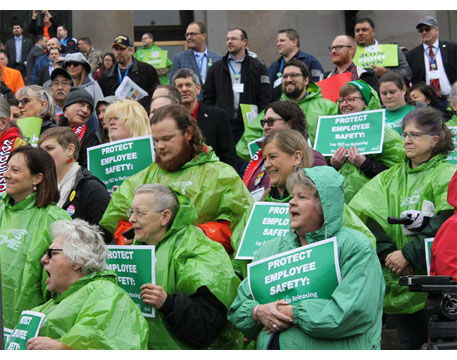 The state Public Records Act explicitly exempts certain personal information about public employees from disclosure, such as home addresses and phone numbers and Social Security numbers. But that privacy was put at risk by a narrow (5-4) State Supreme Court ruling in 2019 that public employees’ birth dates weren’t specifically exempted and were therefore subject to disclosure. As any online security expert will tell you, having a name and birth date makes it easy to find a home address and poses a significant threat to privacy and safety.
The state Public Records Act explicitly exempts certain personal information about public employees from disclosure, such as home addresses and phone numbers and Social Security numbers. But that privacy was put at risk by a narrow (5-4) State Supreme Court ruling in 2019 that public employees’ birth dates weren’t specifically exempted and were therefore subject to disclosure. As any online security expert will tell you, having a name and birth date makes it easy to find a home address and poses a significant threat to privacy and safety.
HB 1888, sponsored by Rep. Zack Hudgins (D-Tukwila), set out to update the Public Records Act to exempt public employees’ birth dates from disclosure. Its passage was a priority for the WSLC.
At the start of the session, HB 1888 faced stiff opposition from newspapers and others. Recent controversial efforts to exempt legislators from certain aspects of public disclosure law had enraged advocates for open government. HB 1888 was portrayed as yet another attack.
The Washington Federation of State Employees/AFSCME 28, Washington Education Association, SEIU 925, the State Council of Firefighters, WPEA/UFCW 365 and other public employees unions led an aggressive campaign to educate and mobilize their members on the issue. In the end, legislators were bombarded by thousands of emails and phone calls, and hundreds of public employees came to Olympia in support of HB 1888. They told lawmakers that disclosure of birth dates endangers victims of domestic abuse or violent crime, increases risk of identity theft and doxxing (where personal identifying data is maliciously posted online), and puts families’ safety at risk.
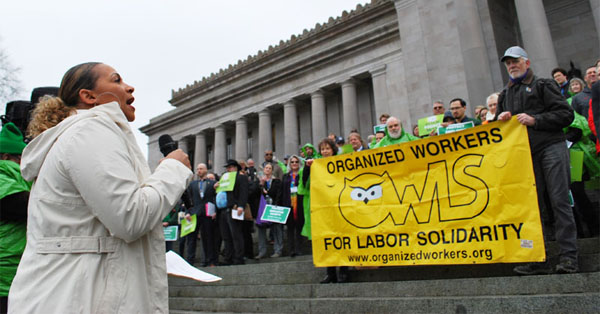
“Other states have acknowledged their duty to protect public employees’ birth dates,” said WSLC Secretary Treasurer April Sims (pictured above) at a Feb. 6 rally on the Capitol steps. “Oregon and California, for example, exempt birth dates from disclosure. It’s time for Washington to protect its public employees’ safety and privacy as well, by passing HB 1888.”
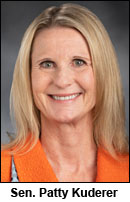
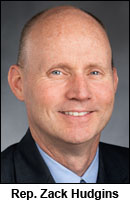 The pressure to fix the law was enormous and forced the bill’s opponents to the table to negotiate a compromise. Led by Hudgins and Sen. Patty Kuderer (D-Bellevue), a compromise was reached to exempt birth dates but allow newspaper reporters legitimate access when investigating government wrongdoing. The amended bill easily passed on bipartisan votes: 91-7 in the House (see Vote #2) and 36-10 in the Senate (Vote #5). Gov. Jay Inslee then signed it into law.
The pressure to fix the law was enormous and forced the bill’s opponents to the table to negotiate a compromise. Led by Hudgins and Sen. Patty Kuderer (D-Bellevue), a compromise was reached to exempt birth dates but allow newspaper reporters legitimate access when investigating government wrongdoing. The amended bill easily passed on bipartisan votes: 91-7 in the House (see Vote #2) and 36-10 in the Senate (Vote #5). Gov. Jay Inslee then signed it into law.
WSLC Proudly Backs Racial Equity Bills, Opportunities for All
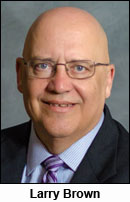 By LARRY BROWN
By LARRY BROWN
President’s Column from the WSLC 2020 Legislative Report
When I campaigned for the honor of serving as President of the Washington State Labor Council, AFL-CIO, I emphasized the importance of maintaining and advancing the WSLC’s groundbreaking racial equity work. As we continue to educate our state’s union leaders and rank-and-file members about the inextricable link between race and labor struggles, we are making our movement stronger.
In addition to these educational efforts, it’s important for organized labor to support public policy changes that promote racial equity. That’s why the WSLC was proud to support the following important bills all championed by women of color in the State Legislature. All of the following bills were approved in 2020 and signed into law by Gov. Jay Inslee:
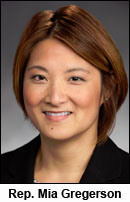 ► Rep. Mia Gregerson (D-SeaTac) sponsored HB 1783 to establish the new Washington State Office of Equity. It will promote access to equitable opportunities and resources that reduce disparities and improve outcomes statewide across all sectors of government.
► Rep. Mia Gregerson (D-SeaTac) sponsored HB 1783 to establish the new Washington State Office of Equity. It will promote access to equitable opportunities and resources that reduce disparities and improve outcomes statewide across all sectors of government.
Unfortunately, the funding for HB 1783 was among the COVID-19 casualties when Gov. Jay Inslee vetoed almost all new spending in the budget. The WSLC will fight to restore this funding when state revenues recover from the coronavirus costs and the resulting economic slowdown.
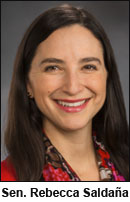 ► Sen. Rebecca Saldaña (D-Seattle) sponsored SB 5165 to prohibit discrimination based on immigration or citizenship status in our state. It does not does not supersede federal law, but allows the state to maximize protections against discrimination.
► Sen. Rebecca Saldaña (D-Seattle) sponsored SB 5165 to prohibit discrimination based on immigration or citizenship status in our state. It does not does not supersede federal law, but allows the state to maximize protections against discrimination.
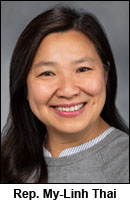 ► HB 2567, sponsored by Rep. My-Linh Thai (D-Bellevue), will ensure open courts for everyone by protecting all people from warrantless civil immigration arrests at courthouses. It prohibits court staff and prosecutors from using state and local justice resources to report people for federal immigration enforcement, and requires courts to collect data on immigration agents’ surveillance of courthouses in Washington. These measures will build community trust in local courts, prohibit immigration agents from interfering in local court functioning, and preserve access to our courts for all.
► HB 2567, sponsored by Rep. My-Linh Thai (D-Bellevue), will ensure open courts for everyone by protecting all people from warrantless civil immigration arrests at courthouses. It prohibits court staff and prosecutors from using state and local justice resources to report people for federal immigration enforcement, and requires courts to collect data on immigration agents’ surveillance of courthouses in Washington. These measures will build community trust in local courts, prohibit immigration agents from interfering in local court functioning, and preserve access to our courts for all.
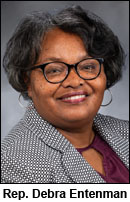 ► Rep. Debra Entenman (D-Kent) sponsored HB 2441 to improve access to Temporary Assistance for Needy Families. It directs the Department of Social and Health Services to conduct outreach to families whose TANF benefits have terminated due to time limits and, if they appear to meet the expanded time-limit extension criteria, to help them to reapply for assistance.
► Rep. Debra Entenman (D-Kent) sponsored HB 2441 to improve access to Temporary Assistance for Needy Families. It directs the Department of Social and Health Services to conduct outreach to families whose TANF benefits have terminated due to time limits and, if they appear to meet the expanded time-limit extension criteria, to help them to reapply for assistance.
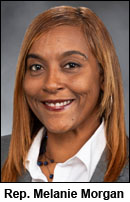 ► HB 2602, sponsored by Rep. Melanie Morgan (D-Parkland), bans race-based hair discrimination. It defines race, which is a protected class, to include traits such as hair texture and “protective hairstyles” like including braids, locks, and twists.
► HB 2602, sponsored by Rep. Melanie Morgan (D-Parkland), bans race-based hair discrimination. It defines race, which is a protected class, to include traits such as hair texture and “protective hairstyles” like including braids, locks, and twists.
HB 1783 creating the State Office of Equity is included in our 2020 Voting Record. It passed on party-line votes: 28-21 in the Senate (Vote #8) and 57-39 in the House (Vote #12). All Democratic legislators voted “yes” and all Republican legislators voted “no.”
It’s disturbing to me that this noble effort to create more equity and opportunity for all Washingtonians should be a partisan issue.
The WSLC Constitution states, “We shall combat resolutely the forces that seek to undermine the democratic institutions of our nation and to enslave the human soul.”
Institutional racism and systemic policies that disadvantage people of color are such forces. I pledge to you that we will continue to combat them, both inside and outside the labor movement – including in Washington state government.
Larry Brown is President of the Washington State Labor Council, AFL-CIO.
WSLC’s Agenda Is All About Worker Solidarity
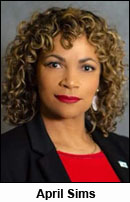 By APRIL SIMS
By APRIL SIMS
From the WSLC 2020 Legislative Report
The labor movement in Washington state is strong and growing in numbers. With the third highest union density in the United States, working people are organized all over Washington, across economic sector, region, ethnicity, and political affiliation. Advancing policies that benefit all workers in Washington, the WSLC’s legislative agenda represents the diversity of the labor movement in the priorities we set.
There can be a tendency to narrow our focus to the differences among the 550,000 working people we represent at the WSLC, familiar dichotomies for many of us: east vs. west; rural vs. urban; blue collar vs. white collar. And while our differences can be important – our environments shape us in many ways – there is far more that unites us than divides us. All of us deserve safe workplaces, decent pay, respect on the job, access to legal remedies when our rights are denied, quality schooling for our kids, and affordable housing for our families. Our legislative agenda was built from these shared needs.
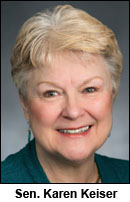 SB 6217, sponsored by Sen. Karen Keiser (D-Des Moines), addressed a fundamental labor priority: providing wage-parity for employees previously exempted from minimum-wage ordinances.
SB 6217, sponsored by Sen. Karen Keiser (D-Des Moines), addressed a fundamental labor priority: providing wage-parity for employees previously exempted from minimum-wage ordinances.
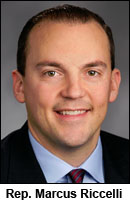 HB 1841 by Rep. Marcus Riccelli (D-Spokane) established minimum railroad crew sizes, legislation that labor has pushed for several sessions. With more than 1 million pounds of oil transported by rail each week across Washington, and longer and more unwieldy trains carrying it, establishing minimum safe crew sizes is essential for protecting the wellbeing of working people, our communities, and our natural resources.
HB 1841 by Rep. Marcus Riccelli (D-Spokane) established minimum railroad crew sizes, legislation that labor has pushed for several sessions. With more than 1 million pounds of oil transported by rail each week across Washington, and longer and more unwieldy trains carrying it, establishing minimum safe crew sizes is essential for protecting the wellbeing of working people, our communities, and our natural resources.
Serving the needs of all working people also requires us to fight for policies that disproportionately impact some of us. We know that discrimination and mistreatment is often meted out to vulnerable workers first to test how far standards can be pushed for all working people, continuing to maintain the harmful systemic inequities that hold back all workers.
We were proud to support several key pieces of legislation addressing gaps in legal protection for working people. Rep. My-Linh Thai (D-Bellevue) sponsored HB 2567 to promote open courts, ensure citizenship status is not a deterrent for exercising legal rights, and establish court processes for folks whose legal rights are violated due to their status. HB 2602 from Rep. Melanie Morgan (D-Parkland) bans hair discrimination, ensuring all Washingtonians can go about their lives without restrictions on the natural way their hair grows out of their head, a freedom many of us take for granted.
We have more work to do in 2021 to build on these gains for working people. SB 6253 by Sen. Claire Wilson (D-Auburn) to create comprehensive early childhood education fell short this year. Likewise, the Domestic Workers Bill of Rights – HB 2511 by Rep. Monica Stonier (D-Vancouver) – would have established necessary protections, legal remedies, and workplace rights for domestic workers. And the Worker Protection Act, HB 1965 by Rep. Drew Hansen (D-Bainbridge Is.), would have established avenues for whistleblowers to hold employers accountable. We’ll continue to fight for these essential policies during the longer 2021 session.
At the heart of our work as a labor organization is the ethos of solidarity; the struggle of one of our union siblings is our collective struggle as a movement. As our movement continues to grow in strength and diversity, that ideal remains our guide.
April Sims is Secretary Treasurer of the Washington State Labor Council, AFL-CIO.
Transparency Needed to Address Health Costs
By SYBILL HYPPOLITE
From the WSLC 2020 Legislative Report
If you didn’t appreciate the critical importance of affordable health care before, you should now.
Long before COVID-19, working families have struggled to pay exorbitant healthcare costs. Many wait too long to seek medical treatment—or forgo it entirely—because they can’t afford it. The consequences can be fatal. But in a global pandemic, such decisions can put families, co-workers, neighbors, and even entire communities at risk.
The problem: how do you address rising healthcare costs if you lack data and information about healthcare spending? It is growing faster than purchasers can sustain while policymakers and patients face a delivery system that is increasingly complex and consolidated.
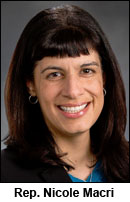 HB 2036, sponsored by Rep. Nicole Macri (D-Seattle) and strongly supported by the Washington State Labor Council, AFL-CIO, would create more transparency to provide oversight and accountability for investments in health care. It would require hospitals in Washington to report annually on certain costs, expenditures and revenues, similar to the requirements of several other states. Hospitals also would have to disclose whether they have a revenue-generating relationship with debt-collection agencies.
HB 2036, sponsored by Rep. Nicole Macri (D-Seattle) and strongly supported by the Washington State Labor Council, AFL-CIO, would create more transparency to provide oversight and accountability for investments in health care. It would require hospitals in Washington to report annually on certain costs, expenditures and revenues, similar to the requirements of several other states. Hospitals also would have to disclose whether they have a revenue-generating relationship with debt-collection agencies.
SHB 2036, an amended version of the bill, passed the House 56-42 (see Vote #3). It retained strong support from the WSLC and other unions, but was opposed by the Washington State Hospital Association. Ultimately, SHB 2036 failed to advance from the Senate.
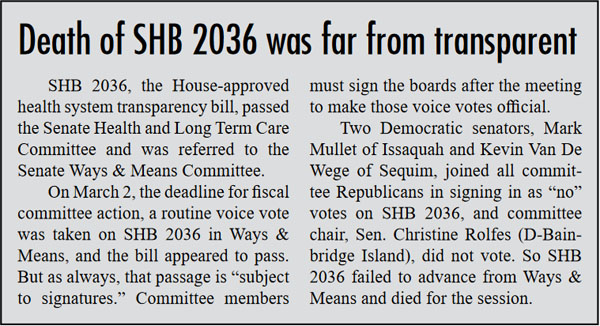
In the wake of the COVID-19 outbreak, hospitals will surely need help to recover. They faced many unanticipated expenses and costs to fight the pandemic, and they lost revenue associated with the suspension of elective surgeries and non-emergency care. But the underlying problem will not magically go away. In fact, the need to understand hospital costs and revenues is even more important now for policymakers and the public.
To ensure patient access while addressing costs in the healthcare system, we need to understand cost drivers in the areas of largest healthcare spending: healthcare delivery. That’s why the WSLC will continue to support updating Washington’s oversight and transparency policies to create a sustainable healthcare system that works for us all.
Sybill Hyppolite is Legislative Director of the Washington State Labor Council, AFL-CIO.
Progress on Labor-Climate Policies, But More Needed
By VLAD GUTMAN-BRITTEN
From the WSLC 2020 Legislative Report
In the wake of a 2019 session where environmental and labor stakeholders came together to advance the most ambitious climate agenda in state history, the 2020 session was a decidedly more staid affair. In partnership, however, we achieved some notable wins, with much work remaining for future sessions:
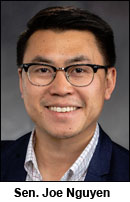 ► ZEV Mandate — Sponsored by Sen. Joe Nguyen (D-West Seattle), SB 5811 requires automakers to sell a certain share of their fleet as electric or other Zero Emission Vehicles. The result will be that automakers will provide more models for sale in Washington and must price them competitively. Washington is the 11th state to adopt the program, with several more considering joining as well. An expanded electric vehicle fleet will mean less spending on transportation, since electricity is much more affordable than gasoline, improved air quality, and a greater investment in charging infrastructure in every corner of the state.
► ZEV Mandate — Sponsored by Sen. Joe Nguyen (D-West Seattle), SB 5811 requires automakers to sell a certain share of their fleet as electric or other Zero Emission Vehicles. The result will be that automakers will provide more models for sale in Washington and must price them competitively. Washington is the 11th state to adopt the program, with several more considering joining as well. An expanded electric vehicle fleet will mean less spending on transportation, since electricity is much more affordable than gasoline, improved air quality, and a greater investment in charging infrastructure in every corner of the state.
► Pipeline Leakage — While gas utilities are required to repair hazardous pipeline defects that pose a public danger, there have been some glaring omissions over the years, and smaller leaks can be left unattended. Customers must pay for this lost energy even though they never receive it, and the leaks are in the form of methane, a potent greenhouse gas. Worse still, gas utilities aren’t required to report how much gas they’ve lost and from what sources, and don’t have to consider health and environmental impacts in deciding what they need to repair.
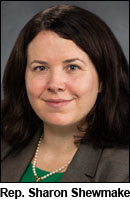 Rep. Sharon Shewmake’s (D-Bellingham) HB 2518 will address all these shortcomings. Utilities will now annually disclose their total lost gas and the Utilities and Transportation Commission will calculate how much is lost as a result of their intentional choices to vent gas. The law will require a broader test for leak repair, considering health and environmental impacts, and improve the standards for maintaining our gas distribution and transmission system. By increasing the number of pipelines upgraded and repaired, the policy will increase employment opportunities for the many union workers that support, maintain, and improve our extensive gas system.
Rep. Sharon Shewmake’s (D-Bellingham) HB 2518 will address all these shortcomings. Utilities will now annually disclose their total lost gas and the Utilities and Transportation Commission will calculate how much is lost as a result of their intentional choices to vent gas. The law will require a broader test for leak repair, considering health and environmental impacts, and improve the standards for maintaining our gas distribution and transmission system. By increasing the number of pipelines upgraded and repaired, the policy will increase employment opportunities for the many union workers that support, maintain, and improve our extensive gas system.
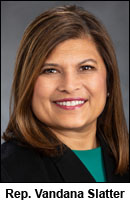 ► Climate Pollution Limits — In 2008, our state adopted its first greenhouse gas emission limits. These were out-of-date almost as soon as that session ended. So this year Rep. Vandana Slatter (D-Bellevue) introduced new targets based on the most current available science. The new limits set an intention for Washington to cut its greenhouse gas pollution by 95% from 1990 levels by 2050, while achieving net-zero emissions at the same time through natural climate solutions so richly available in the Pacific Northwest. HB 2311 also sets a firm intention that when we begin adopting policies to realize these goals, we must also incorporate the needs and priorities of workers—incentivizing not just jobs, but good jobs; supporting workers caught in the transition; and protecting manufacturers through the clean energy transition.
► Climate Pollution Limits — In 2008, our state adopted its first greenhouse gas emission limits. These were out-of-date almost as soon as that session ended. So this year Rep. Vandana Slatter (D-Bellevue) introduced new targets based on the most current available science. The new limits set an intention for Washington to cut its greenhouse gas pollution by 95% from 1990 levels by 2050, while achieving net-zero emissions at the same time through natural climate solutions so richly available in the Pacific Northwest. HB 2311 also sets a firm intention that when we begin adopting policies to realize these goals, we must also incorporate the needs and priorities of workers—incentivizing not just jobs, but good jobs; supporting workers caught in the transition; and protecting manufacturers through the clean energy transition.
But more work remains. Adopting ambitious limits means additional legislation is needed to make them real.
► The Clean Fuel Standard has existed for years in California, Oregon and British Columbia, and will be adopted by all of Canada in the next several years, It requires a gradual reduction in the carbon intensity of transportation fuels—increasing access to petroleum alternatives like biofuels and electricity that we largely don’t have right now.
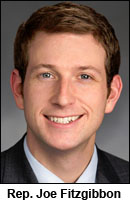 The policy earned the support of a number of WSLC affiliated unions who see value in climate mitigation and job creation opportunities in biofuels and electric vehicles. Other affiliates expressed concern about the potential risk the policy could pose to a future transportation revenue and investment package, which the state desperately needed even before last year’s passage of I-976. Gratitude to Rep. Joe Fitzgibbon (D-West Seattle), the prime sponsor and a long-time labor and climate champion, for working for a compromise that included postponing implementation of the clean fuel standard until after the passage of such a transportation package.
The policy earned the support of a number of WSLC affiliated unions who see value in climate mitigation and job creation opportunities in biofuels and electric vehicles. Other affiliates expressed concern about the potential risk the policy could pose to a future transportation revenue and investment package, which the state desperately needed even before last year’s passage of I-976. Gratitude to Rep. Joe Fitzgibbon (D-West Seattle), the prime sponsor and a long-time labor and climate champion, for working for a compromise that included postponing implementation of the clean fuel standard until after the passage of such a transportation package.
While that policy and others didn’t make it across the finish line this year, Olympia’s climate conversation will continue in future sessions.
Vlad Gutman-Britten is Infrastructure and Climate Advisor of the Washington State Labor Council, AFL-CIO.
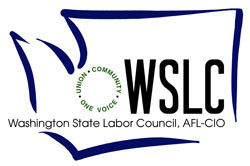 The WSLC 2020 Legislative Report includes many more articles on building trades legislation, our state’s transportation system, workers’ compensation, aerospace tax incentives, and much more. Download the full 8-page PDF to read them all, or request the printed edition or call 206-281-8901 to order multiple copies.
The WSLC 2020 Legislative Report includes many more articles on building trades legislation, our state’s transportation system, workers’ compensation, aerospace tax incentives, and much more. Download the full 8-page PDF to read them all, or request the printed edition or call 206-281-8901 to order multiple copies.
The WSLC is the largest union organization in Washington state, representing the interests of more than 600 local unions and councils with approximately 550,000 rank-and-file members. For more information, visit www.wslc.org.





